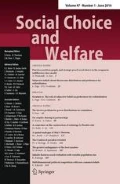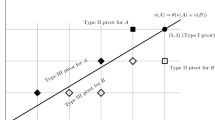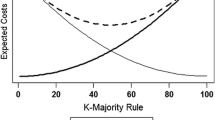Abstract.
We examine the division of resources among individuals by flexible majority rules where the majority necessary to adopt a proposal depends on the proposal itself. For instance, the size of the majority may increase with the maximal difference between the shares individuals receive. For large discount factors such rules imply an efficient and even distribution of resources. For low discount factors flexible majority rules supplemented by specific agenda-planning rules such as agenda rights for the opposition guarantee envy-free distribution. Uncertainty about discount rates can make it easier to achieve efficient and envy-free allocations.
Similar content being viewed by others
Author information
Authors and Affiliations
Corresponding author
Additional information
I would like to thank Clive Bell, Peter Bernholz, Theresa Fahrenberger, Amihai Glazer, Ulrich Erlenmaier, Volker Hahn, Hans Haller, Klaus Schmidt, Eva Terberger-Stoy, seminar participants in Heidelberg and Munich and conference participants at the meeting of the Public Choice Society for their helpful comments.
Rights and permissions
About this article
Cite this article
Gersbach, H. Dividing resources by flexible majority rules. Soc Choice Welfare 23, 295–308 (2004). https://doi.org/10.1007/s00355-004-0314-6
Received:
Accepted:
Issue Date:
DOI: https://doi.org/10.1007/s00355-004-0314-6




